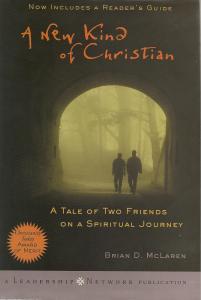I am way behind with my book reviewing. Years behind, it would
appear. I live in hope that I'll be catching up soon, but I'm not sure
how realistic that is.
Background - chat
with my parents about church and life and lots of stuff. Also,
wondering about the shape of and vision for the church generally. And
this book was lent to me.
It's
not my copy, and the handwritten comment in the front of the book is
'Enjoy and celebrate this excellent piece of heresy'. Now, this comment
was made tongue in cheek, but illustrates one view of this book (and
other books like it). There can be a temptation to throw it out,
labelling it as heretical. But I don't think it's quite so clear as all
that.
The book is written as a series of
conversations and communications between two individuals, with some
accompanying 'storyline'. One individual is a pastor, the other a high
school teacher. Their interactions consider the societal landscape and
the place of the church in this. There is much talk of modernity and
postmodernity. There's some helpful stuff on what distinguishes one
from the other. The book then serves as a challenge to move the church
from a modern to a postmodern approach to things. This will scare some
and worry others. The pastor, Dan, takes the role of the one being
encouraged to move forwards, with the guidance, encouragement and
challenge of the high school teacher, Neo. The pastor writes in his
journal: "I'm scared. The kinds of things I'm thinking will surely be
considered heresy." Neo encourages Dan to recognise that the
Christianity of which we are a part is not simply Bible-based, but is
also shaped by the foundry of the Modern Age in which it has been
hammered out.
I think the book helps to
clarify a lot of stuff that I've been thinking about. There can
sometimes be a danger (perhaps this is particularly true in some
evangelical circles) of worrying more about winning an argument than
being God's ambassador. There's some stuff that I'd probably question -
some ideas about eternity seem a bit hazy, but that may be partly
because I've only read it through once (relatively quickly) and not
really delved fully into some of its conclusions.
On
the whole, though, I'd say it was a really great read. It's wonderful
to see that people are looking to press forward; not leaving scripture
behind, but leaving behind some of the things that have, through the age
of Modernity, been welded onto scripture. It's written by an American,
presumably mainly for an American audience, so you'll find things like
characters saying 'I sure am', where 'I am' would suffice :)
There's
also a lot on 'spirituality', which is obviously an area in which I am
interested. It's nice to see spiritual disciplines being bigged up in
books. Maybe I should drop Brian a line...
Further comments are welcome! Particularly if you've read the book, but that's not necessarily a requirement :)
Tuesday, 9 June 2015
Subscribe to:
Post Comments (Atom)

No comments:
Post a Comment